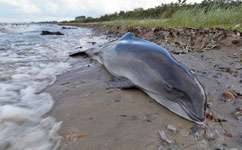(Phys.org) —Sonar used by the navy may cause porpoises to get trapped in fishing nets and killed, according to a recent study.
Research into the reasons for a mass standing of harbour porpoises on the Danish coast in 2005 found a possible link between the presence of the navy and the number of porpoises stranded.
During nine days in April 2005, an unprecedented 85 harbour porpoises were washed up dead along 100km of the Danish coast. Since the average number of porpoises stranded in the whole of Denmark is just over one a week, this event was extremely unusual.
The injuries sustained by many of the porpoises indicated that an abnormally high proportion had been caught in fishing nets and fallen or been thrown back into the water dead. But this alone did not explain the huge number of casualties.
'The ultimate cause of death was definitely bycatch, because the porpoises had net marks and many had missing fins and tails,' says Dr Andrew Wright, the lead author of the study, 'but that number of strandings couldn't be explained by the level of fisheries in the area at the time.'
By looking at data on all harbour porpoises stranded in Denmark between 2003 and 2008 - a total of 791 animals - the researchers concluded that the navy, which was active in the area at the time, may have been partly to blame. They think naval sonar could have distracted the porpoises, making them more likely to get caught in the nets.
'We looked in detail at a lot of possible factors that could have contributed to the strandings,' says Wright, 'and the statistics suggested the navy may have played a role. When we looked at what role they could have played, we concluded that the porpoises were most likely distracted by the sonar. Think of it as if you heard a noise over your shoulder walking down the street, then you turn to look and walk straight into a lamp-post.'
These results fit with reports linking naval activity to strandings of other marine mammals, including beaked whales. But it is difficult to know how navies affect these animals, because information about where they are operating is often not freely available. 'Without access to detailed data on naval activity, it's difficult to draw firm conclusions,' says Wright.
There are many reasons that marine mammals like porpoises might become stranded. These include failure to navigate correctly, extreme weather such as hurricanes, disease, and exposure to human activity. This new research suggests that in many cases the cause may be a combination of these factors.
'People looking at strandings are often looking for a single cause, because it makes a nice story,' says Wright. 'But the reality is likely to be much more complicated.'
If, as these results suggest, naval sonar can contribute to the deaths of porpoises, this indicates that any loud sound produced by humans at sea may be posing a danger to marine life. 'We may well be having a greater impact with our use of noise in the oceans than we realise,' says Wright.
The research is published in PLOS ONE.
More information: Wright, A. et al. (2013) Possible Causes of a Harbour Porpoise Mass Stranding in Danish Waters in 2005. PLoS ONE 8(2): e55553. doi:10.1371/journal.pone.0055553
Journal information: PLoS ONE
Provided by PlanetEarth Online
This story is republished courtesy of Planet Earth online, a free, companion website to the award-winning magazine Planet Earth published and funded by the Natural Environment Research Council (NERC).






















